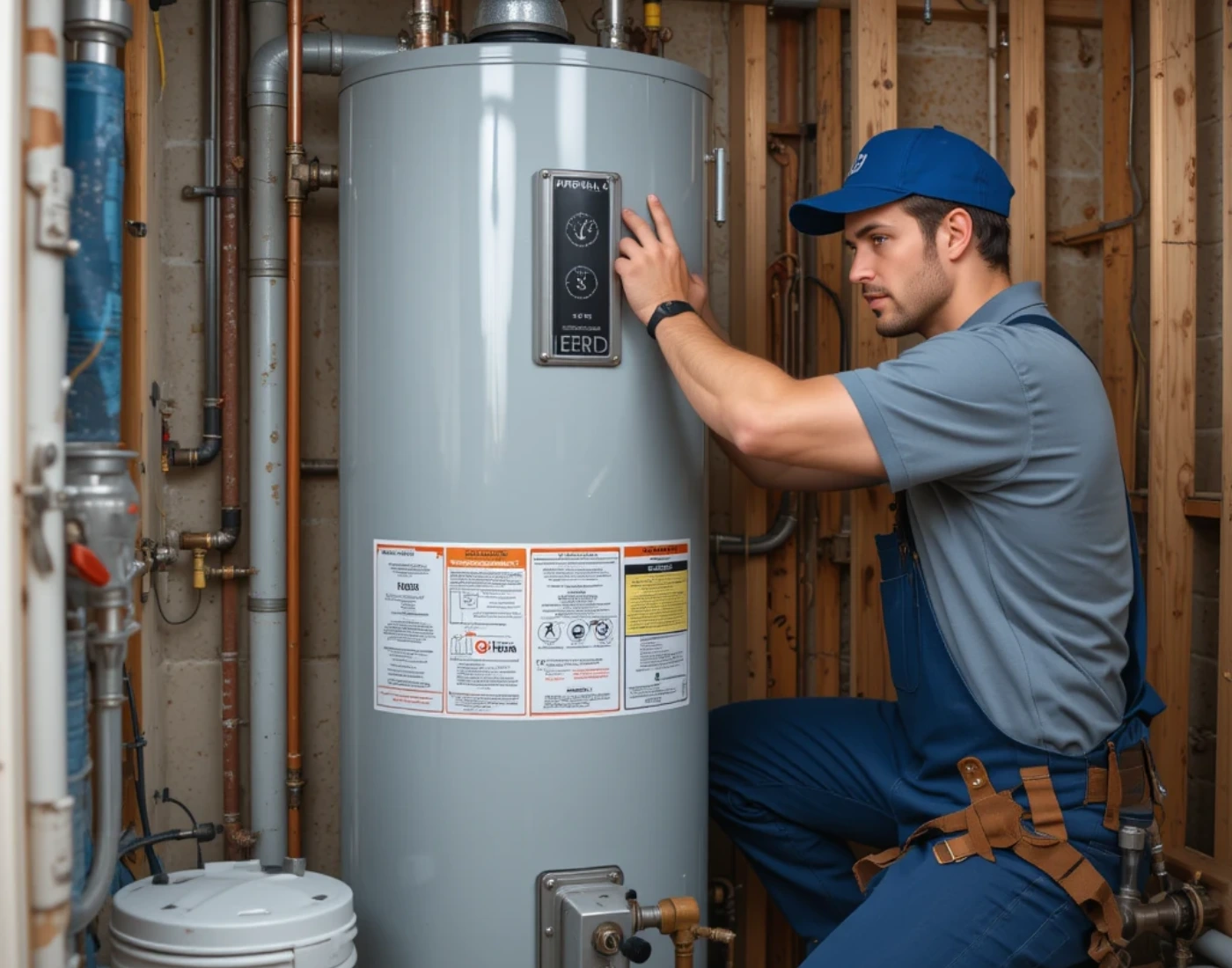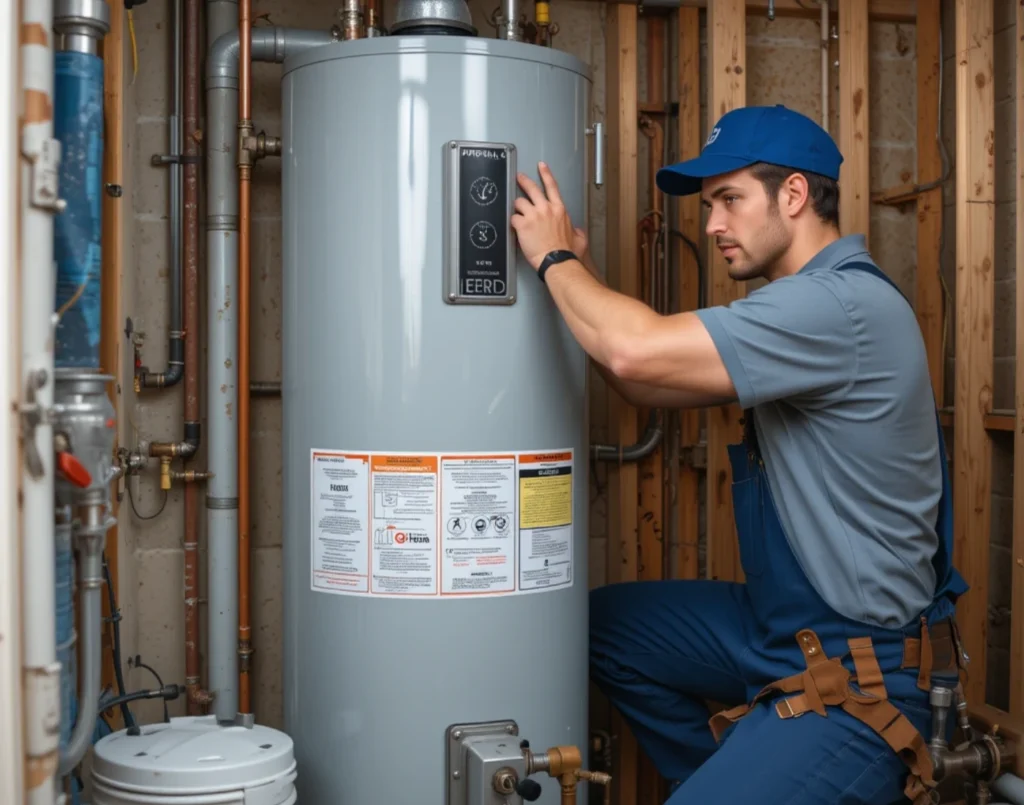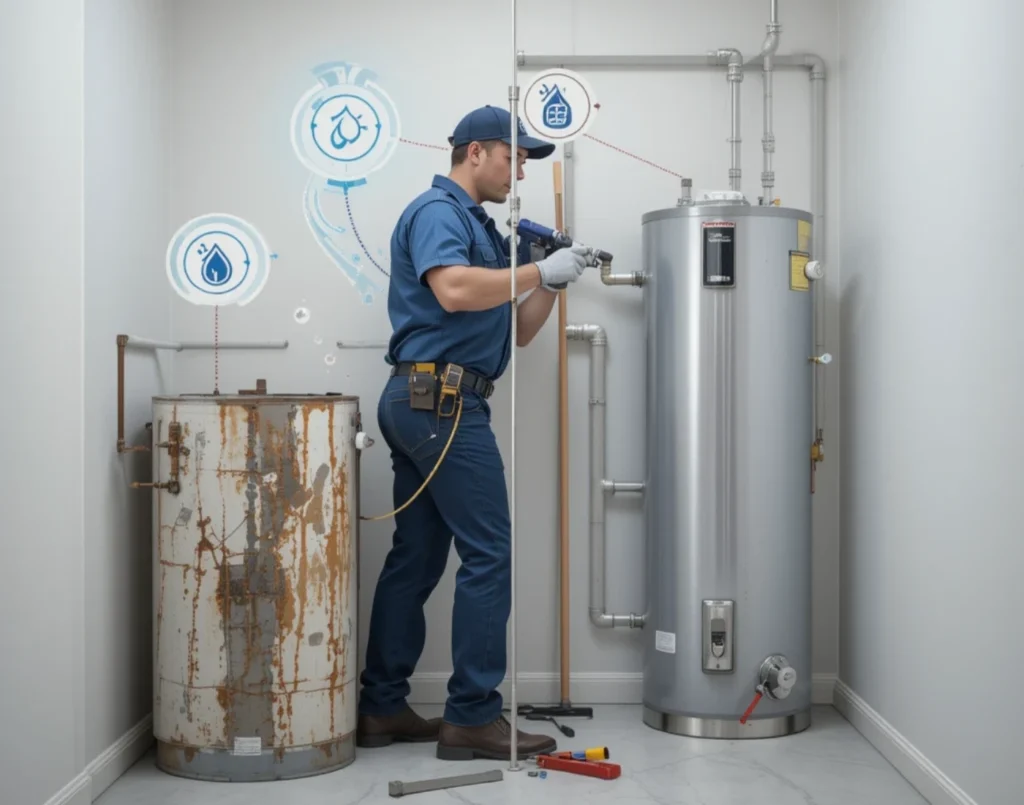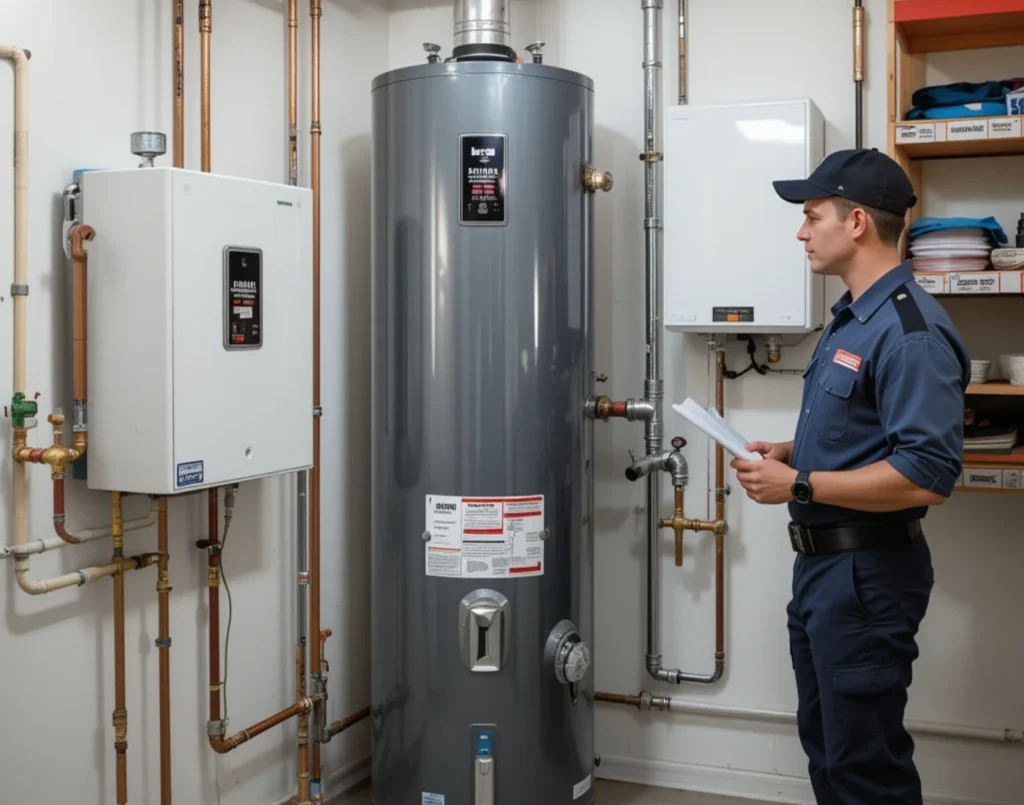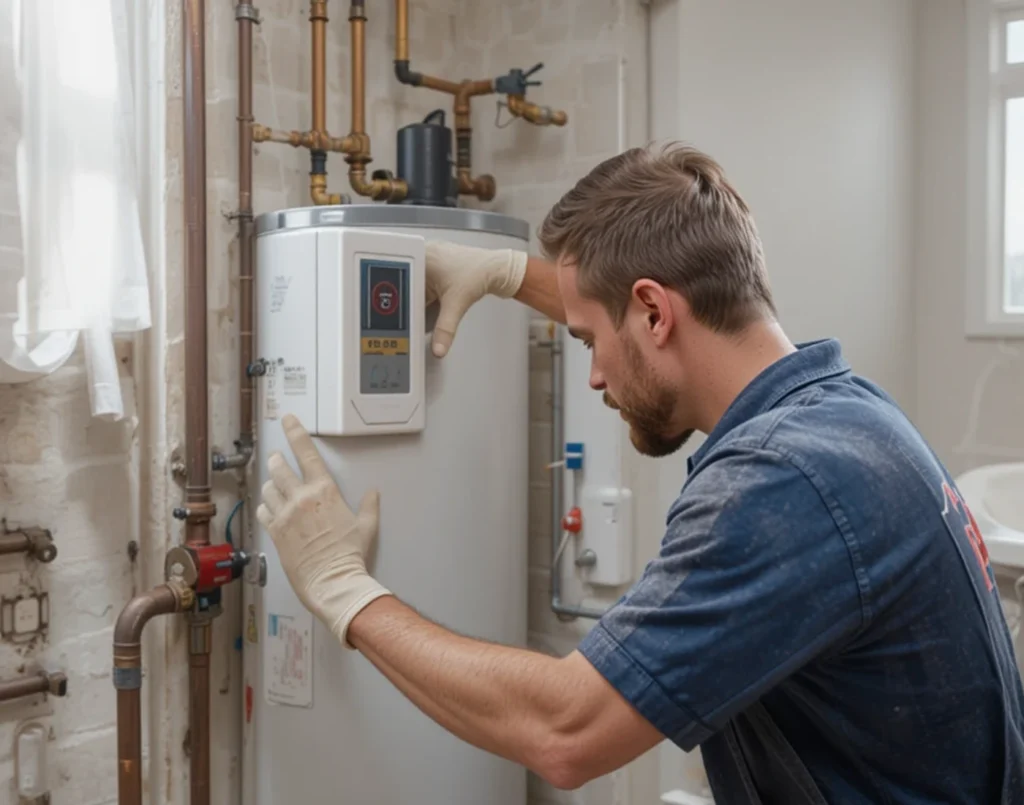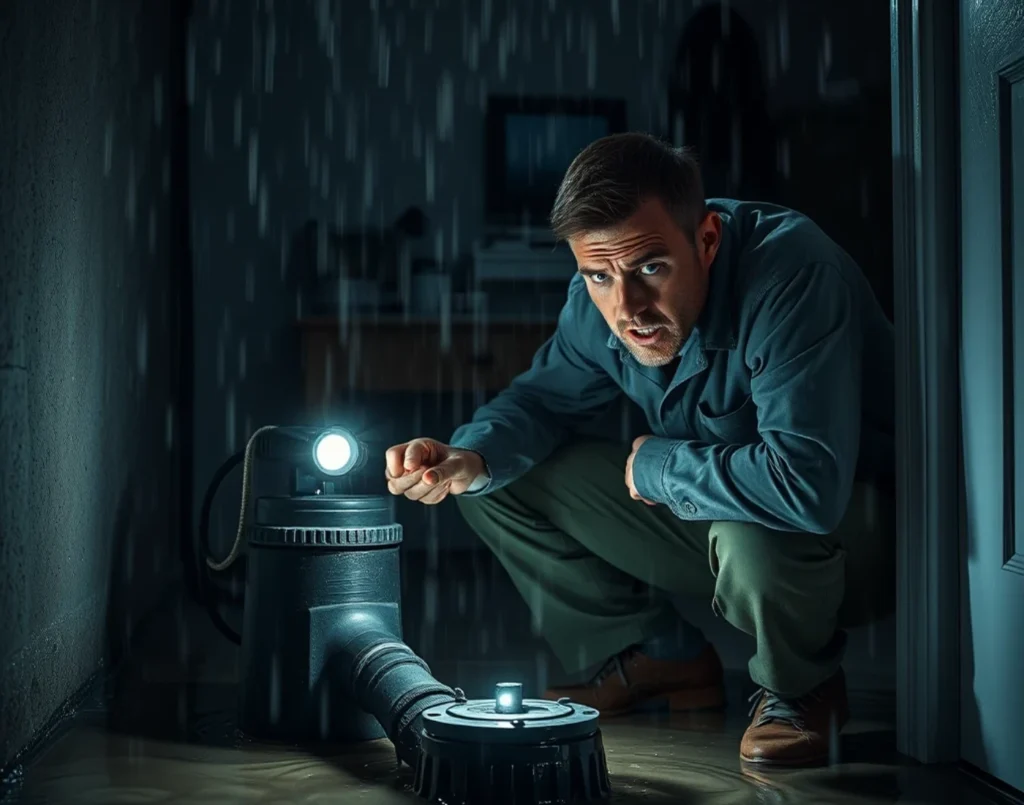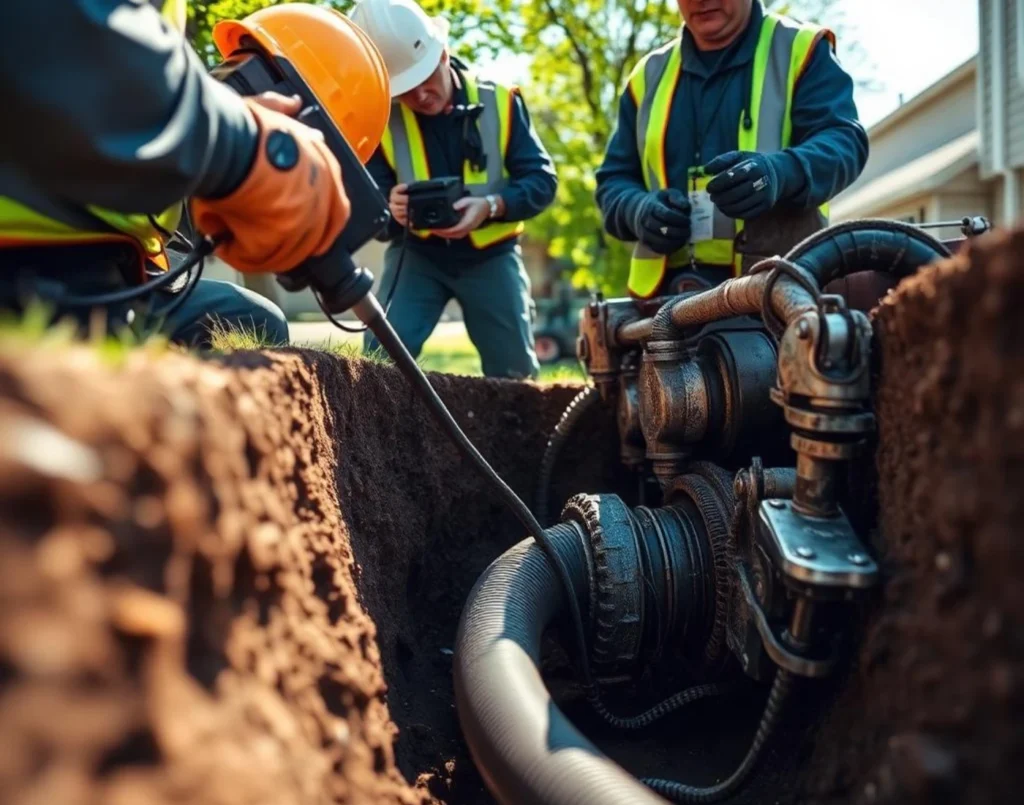When your pipes leak at 2 AM or your water heater fails, you don’t just ask, “How do I fix this?” But, “How much will this cost me?” Knowing plumbing repair costs helps you plan for surprises. It also helps you make smart choices about your home’s care.
Plumbing repair costs can vary greatly depending on the complexity of the problem and your location. Simple fixes like drain cleaning range from $100-$300, while major repairs, such as sewer line replacement, can cost $3,000-$15,000. Factors like labour rates, material costs, emergency fees, and regional pricing influence the final cost, with urban areas generally being 20-30% more expensive.
Factors affecting costs include:
- Labour rates ranging from $45-$150 per hour
- Material costs vary by quality and availability
- Emergency service fees add $50-$200 to standard rates
- Regional pricing differences with urban areas typically cost 20-30% more
Overview of Plumbing Repair Costs
Most homeowners spend between $175 and $450 for typical plumbing repairs. Costs can vary widely. Minor fixes may cost around $50, while extensive system replacements can exceed $10,000. The national average sits around $315 for common plumbing issues.
Knowing these basic costs helps you plan for regular upkeep and sudden emergencies. Your local plumbing contractor knows the market rates. They can provide you with better estimates.
Importance of Understanding Repair Expenses
Knowing repair costs in advance stops contractors from overcharging. It also helps you decide which issues need urgent care. Emergency repairs usually cost 1.5 to 3 times more than regular service calls. So, fixing small issues before they become big problems is important.
Delays in repairs can cause water damage. This may lead to thousands of dollars in extra restoration costs.
What factors affect your plumbing costs?
Several key elements determine how much you’ll pay for plumbing services. Knowing these elements helps you budget for costs and negotiate fair prices.
Location and Regional Pricing
Geographic location significantly impacts plumbing costs. Cities like New York and San Francisco cost 30-50% more than rural areas. Licensed plumber rates in major cities range from $75-$150 per hour, while smaller towns may charge $45-$90 per hour.
Cost of living, local regulations, and competition levels all influence regional pricing. Areas with strict licensing requirements typically have higher service rates.
Labour and Material Costs
Labour accounts for 60-70% of most plumbing repair bills. Skilled plumbers charge more, but their know-how saves money. They finish jobs quickly and do them right the first time.
Material costs fluctuate based on:
- Pipe material type (PVC, copper, PEX)
- Fixture quality (standard vs. premium brands)
- Speciality parts availability
- Local supplier pricing
Urgency and Timing of Service
Emergency services carry premium pricing. Calls on weekends, holidays, or after hours usually cost an extra $50 to $200 compared to regular rates. Burst pipes or gas leaks need quick action. They can be much more expensive than regular maintenance.
Schedule non-urgent maintenance during regular business hours. This can cut costs by 25–40%.
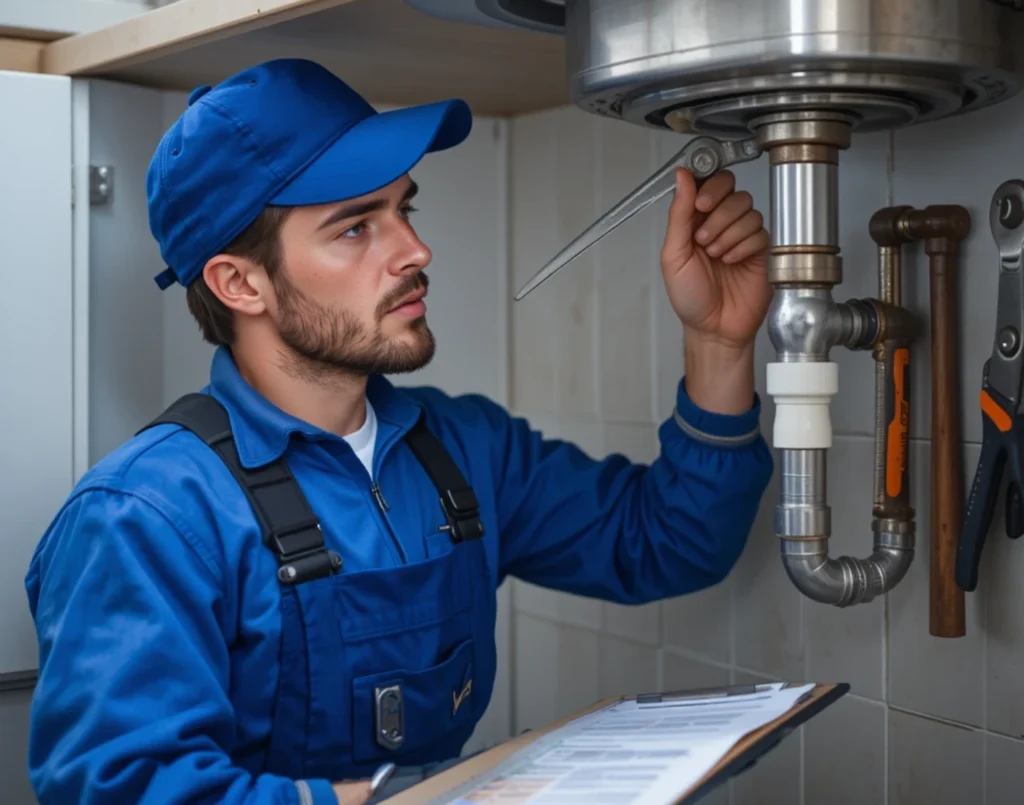
How Much Do Common Repairs Cost?
Different plumbing issues carry varying price ranges. Here’s what you can expect for the most frequent problems homeowners face.
Fixing Leaks
Leak repairs range from $150-$850, depending on location and severity.
- Leaky faucet repairs: $100-$350 for parts and labour
- Pipe leak fixes: $200-$600 for accessible pipes
Hidden leaks that need wall or floor access are more expensive. This is because they require extra restoration work. Main water line leaks can reach $1,500-$3,000 for complete repairs.
Unclogging Drains
Clogged drain solutions vary by method and severity. Kitchen drains with grease buildup often cost more than bathroom sink clogs.
- Basic drain snaking: $100-$250
- Hydro jetting: $300-$600
- Camera inspection: $200-$400
- Main sewer line cleaning: $350-$800
Repairing Water Heaters
Water heater repair costs can differ a lot. This depends on the problem and the equipment used. Replacing a thermostat usually costs between $150 and $300. This makes it one of the cheaper repairs. If the problem is a faulty heating element, expect to pay between $200 and $450. Tank leaks can lead to serious problems. They often need a lot of work and materials. Fixing them can cost between $300 and $600. If the unit is beyond repair, replacing the water heater costs between $1,200 and $3,500. This price depends on the size, brand, and type, whether tank or tankless. Understanding these cost ranges helps you plan for repairs or upgrades more effectively.
Gas water heater repairs often cost more because of safety rules and the need for special parts.
Should you DIY or hire professionals?
Your skill level, the issue’s complexity, and available time will affect your decision to hire a plumber or tackle it yourself.
Pros and Cons of DIY Repairs
DIY plumbing can save money on simple tasks like:
- Replacing toilet flappers
- Installing new showerheads
- Clearing minor drain clogs
- Fixing running toilets
However, DIY mistakes often create bigger problems. Bad pipe connections can lead to water damage. Also, gas line work needs a pro for safety.
Benefits of Hiring a Professional Plumber
Licensed professionals bring expertise, proper tools, and warranties to every job.
- Code compliance: Ensures work meets local building standards
- Insurance coverage: Protects against damage from faulty work
Professional plumbers find hidden issues that could lead to future problems. This can save you thousands in repeated repairs.
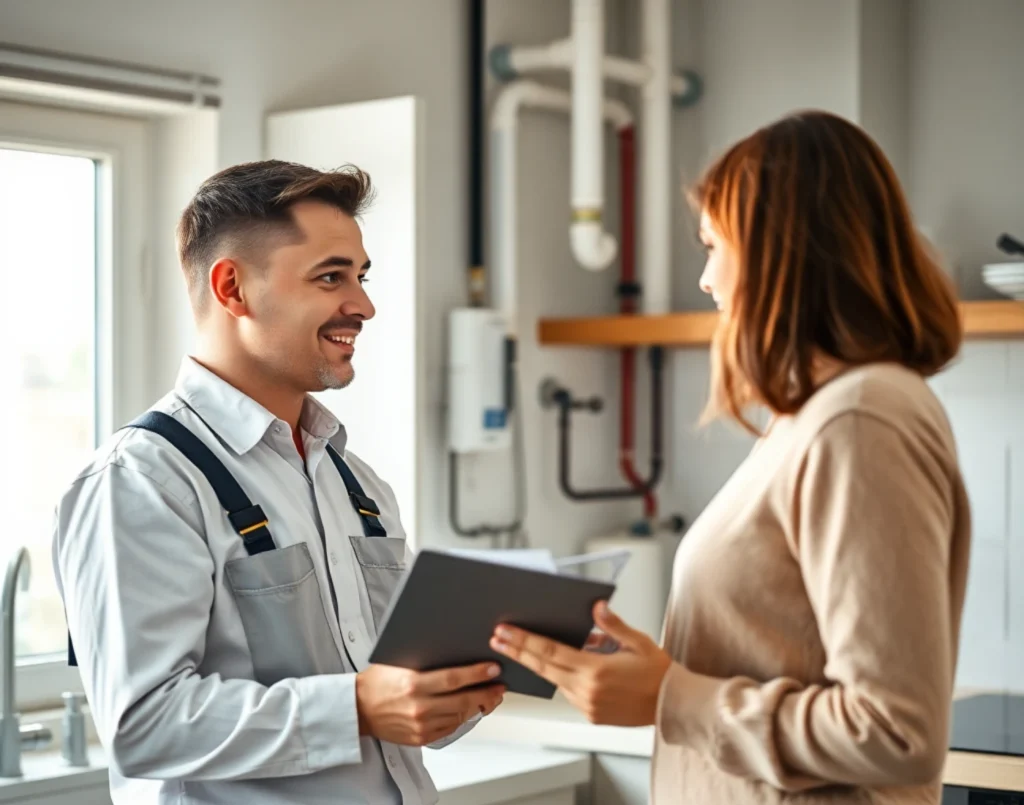
What Are Smart Ways to Save Money?
Strategic planning and preventive maintenance can significantly reduce your plumbing costs over time.
Tips for Cost-Effective Solutions
Multiple quotes help ensure fair pricing. Get at least three estimates for major repairs to compare rates and approaches. Choose licensed plumbers with great reviews, not just the lowest prices.
Consider these money-saving strategies:
- Bundle multiple repairs for potential discounts
- Schedule non-urgent work during regular hours
- Maintain existing fixtures to extend their lifespan
- Address small issues quickly before they worsen
Utilising Warranties and Insurance
Check if your repairs qualify for warranty coverage or homeowner’s insurance claims. Water heater manufacturers often provide 5-10 year warranties on parts and labour. Some insurance policies may not cover slow leaks, but unexpected pipe breaks are. Review your coverage to understand what’s included.
Understanding Plumbing Estimates
Professional estimates should include detailed breakdowns of labour, materials, and additional fees. This transparency helps you compare options and budget accurately.
What to Look for in an Estimate
Quality estimates include:
- Itemised labour costs with hourly rates
- Material specifications with brand names and quantities
- Timeline expectations for project completion
- Warranty information on parts and artistry
Questions to Ask Your Plumber
Before hiring, ask these important questions:
- Are you licensed and insured in this area?
- What warranties do you provide on parts and labour?
Ask about payment schedules, cleanup duties, and what to do if more issues come up during repairs.
Signs You Need a Plumber
Recognising early warning signs helps prevent minor issues from becoming major expenses.
Detecting Plumbing Issues Early
Watch for these common indicators
A common warning sign of plumbing problems is low water pressure in your home. This may mean there are hidden leaks or pipe blockages. You may hear odd sounds, like gurgling drains or banging pipes. This is common when appliances or fixtures are running. Water stains on walls, ceilings, or floors can show slow leaks behind surfaces. Also, bad smells from drains or fixtures can mean clogs or sewer line issues. Inspect visible pipes and fixtures each month. This helps you find problems early and fix them before they get worse.
When to Call a Professional
Some plumbing issues need a pro. This is for safety, complexity, or legal reasons. Gas line issues are dangerous. Only licensed technicians should handle them. Sewer line issues often mean deep clogs or damage. These problems require special tools, like video inspection devices or hydro-jetting machines. Major pipe replacements usually need city permits and code inspections. So, they’re not good for DIY projects. According to local building codes, water heaters should be installed, especially gas or high-voltage electric ones. This ensures they operate safely. Trying these repairs yourself can be risky. It might also void your warranties or go against your insurance policies. Always leave these tasks to licensed professionals.
Regional Cost Variations
Knowing local market rates helps you budget and spot fair prices nearby.
Understanding Local Market Rates
Research typical rates in your region by:
- Calling local contractors for basic service quotes
- Checking online platforms like Angie’s List or HomeAdvisor
- Asking neighbours about their recent plumbing experiences
Consider your area’s cost of living when you compare local prices to national averages.
Comparing Costs in Urban vs. Rural Areas
Urban areas typically charge more due to:
- Higher overhead costs for business operations
- Increased demand for skilled plumbers
Rural areas often have fewer contractors. This can raise costs, even if general prices are lower.
Preventative Measures to Avoid Excess Costs
Routine maintenance boosts your plumbing system’s lifespan. It also helps avoid expensive emergency repairs.
Importance of Regular Maintenance
Plumbing inspections can save you a lot on repairs. They usually cost between $200 and $400 each year.
Professional maintenance includes:
- Drain cleaning to prevent major clogs
- Water heater flushing to remove sediment buildup
- Pipe inspection to identify potential problems
- Fixture adjustments to ensure proper operation
Many plumbing services offer maintenance contracts with discounted rates for regular customers.
Pro Tips / Safety Advice
Safety should always be your top priority when dealing with plumbing issues. Know your main water shut-off valve location before emergencies occur. This simple knowledge can stop serious water damage as you wait for help.
Never ignore gas smells around water heaters or appliances. Evacuate immediately and call your gas company’s emergency line. Gas leaks need quick help from experts. Never try to fix them yourself.
Final Thoughts / Encouragement
Knowing plumbing repair costs helps you make smart choices for your home’s care. Plumbing problems can be stressful. But knowing what to expect helps you manage repairs. This way, you can avoid paying too much for services.
Remember that investing in quality repairs and regular maintenance pays off long-term. A good plumbing system keeps your home valuable. It also stops expensive emergencies that can interrupt your daily life.
Read Also: Plumbing Repair Costs Explained: A Homeowner’s Guide to Pricing
Frequently Asked Questions
1. How much does a plumbing service cost?
The cost of a plumbing service depends on the type of service required. Simple tasks, like drain cleaning, typically cost between $100 and $300, while more extensive services, like pipe replacement or sewer line repairs, can range from $3,000 to $15,000.Labour rates, material costs, and location influence the overall price.
2. How much does it cost to fix a plumbing issue?
Fixing a plumbing issue can vary in cost depending on the severity of the problem. Minor fixes, such as unclogging drains, can cost between $100 and $300. Major issues, like a sewer line replacement, may cost anywhere from $3,000 to $15,000, depending on the complexity of the repair and the area you live in.
3. What is the average cost range for plumbing repairs in Tooting?
The average cost for plumbing repairs in Tooting depends on the type of repair. Minor repairs can cost between £80 and £250, while more complex issues, like replacing sewer lines, can cost £2,500 to £10,000. Prices may vary due to factors like labour rates, material quality, and regional differences in pricing.
4. How can I prevent costly plumbing repairs in my home?
To prevent costly plumbing repairs, ensure regular maintenance such as inspecting pipes for leaks, cleaning drains, and checking for water pressure issues. Avoid pouring grease or non-degradable items down drains and schedule periodic professional inspections to catch problems early. Installing water filters and pipe insulation can help avoid larger, expensive repairs.
5. How do marine pipe experts ensure safety during repairs?
Marine pipe experts ensure safety during repairs by following strict protocols and using specialised equipment. Before starting any work, they conduct thorough risk assessments to identify potential hazards, such as leaks or exposure to hazardous materials.

